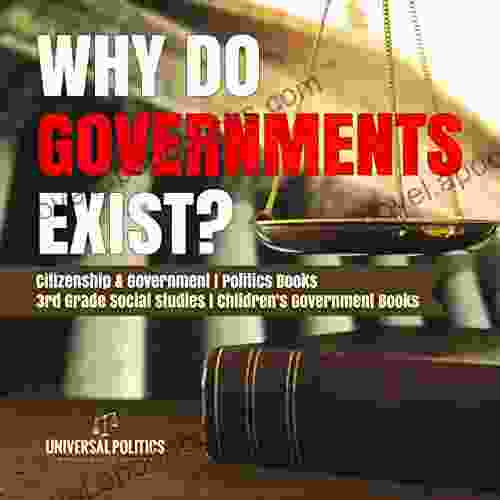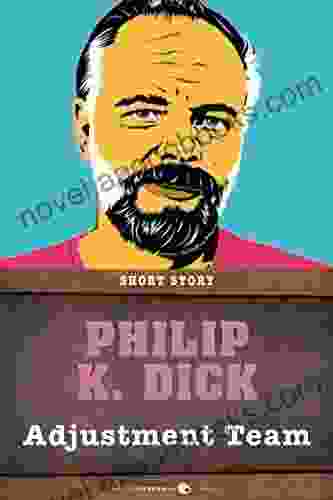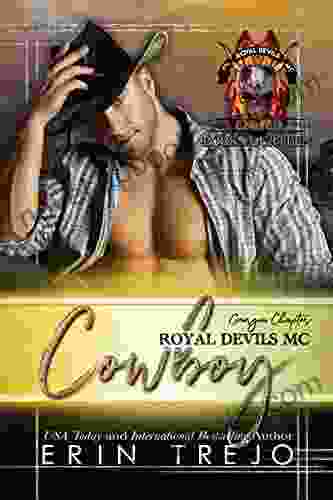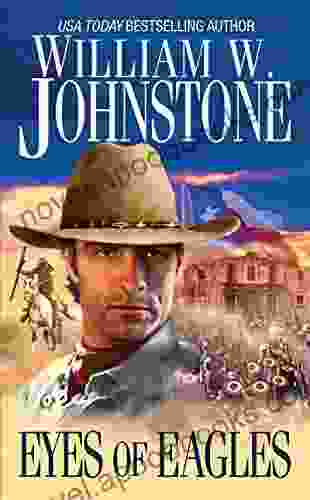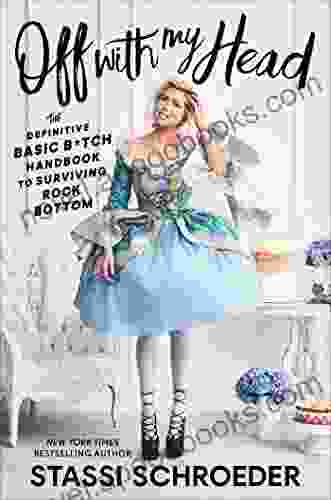Why Do Governments Exist? Citizenship, Government, and Politics for 3rd Grade Social Studies

This engaging and informative book introduces young readers to the concepts of citizenship, government, and politics. With clear explanations and engaging activities, students will learn about the different types of governments, how they work, and how citizens can participate in their government.
4.6 out of 5
| Language | : | English |
| File size | : | 43209 KB |
| Screen Reader | : | Supported |
| Print length | : | 76 pages |
What is government?
A government is a group of people who are responsible for making and enforcing laws. Governments can be local, state, or national. Local governments are responsible for things like garbage collection, police protection, and road maintenance. State governments are responsible for things like education, healthcare, and transportation. National governments are responsible for things like foreign policy, defense, and the economy.
Why do governments exist?
Governments exist to protect citizens and provide for their needs. Governments provide essential services like law enforcement, education, and healthcare. They also help to regulate the economy and protect the environment.
What are the different types of governments?
There are many different types of governments in the world. Some of the most common types include:
- Monarchies: Monarchies are ruled by a king or queen. The king or queen is usually the head of state and has the power to make laws.
- Dictatorships: Dictatorships are ruled by a single person who has absolute power. The dictator can make laws, appoint judges, and control the military.
- Democracies: Democracies are ruled by the people. Citizens elect representatives to make laws and run the government.
How can citizens participate in their government?
There are many ways that citizens can participate in their government. Some of the most common ways include:
- Voting: Voting is one of the most important ways that citizens can participate in their government. By voting, citizens can choose the leaders who will make decisions about their future.
- Running for office: Citizens can also run for office and become elected officials. This is a great way to get involved in government and make a difference in your community.
- Attending public meetings: Public meetings are a great way to learn about what your government is ng and to voice your opinion.
- Contacting your elected officials: You can also contact your elected officials to let them know your opinion on issues that are important to you.
Governments are an essential part of society. They provide essential services, protect citizens, and help to regulate the economy. By understanding how governments work, citizens can be more informed and active participants in their democracy.
Activities
Here are some activities that you can do to help students learn about citizenship, government, and politics:
- Have students create a poster or diorama that shows the different branches of government.
- Have students write a letter to their elected officials about an issue that they care about.
- Have students participate in a mock election.
- Take students on a field trip to a local government building.
- Have students interview a government official.
Additional resources
Here are some additional resources that you can use to learn more about citizenship, government, and politics:
- The United States Constitution: https://www.usconstitution.net/
- The Bill of Rights: https://www.archives.gov/founding-docs/bill-of-rights
- The Declaration of Independence: https://www.archives.gov/founding-docs/declaration-transcript
- The Federalist Papers: https://www.history.com/topics/us-constitution/federalist-papers
- The Anti-Federalist Papers: https://billofrightsinstitute.org/primary-sources/the-anti-federalist-papers
4.6 out of 5
| Language | : | English |
| File size | : | 43209 KB |
| Screen Reader | : | Supported |
| Print length | : | 76 pages |
Do you want to contribute by writing guest posts on this blog?
Please contact us and send us a resume of previous articles that you have written.
 Book
Book Novel
Novel Page
Page Chapter
Chapter Text
Text Story
Story Genre
Genre Reader
Reader Library
Library Paperback
Paperback E-book
E-book Magazine
Magazine Newspaper
Newspaper Paragraph
Paragraph Sentence
Sentence Bookmark
Bookmark Shelf
Shelf Glossary
Glossary Bibliography
Bibliography Foreword
Foreword Preface
Preface Synopsis
Synopsis Annotation
Annotation Footnote
Footnote Manuscript
Manuscript Scroll
Scroll Codex
Codex Tome
Tome Bestseller
Bestseller Classics
Classics Library card
Library card Narrative
Narrative Biography
Biography Autobiography
Autobiography Memoir
Memoir Reference
Reference Encyclopedia
Encyclopedia Stephen Erickson
Stephen Erickson Ron Garverick
Ron Garverick Rimmy London
Rimmy London Victor Sheymov
Victor Sheymov T Chris Riley Tillman
T Chris Riley Tillman Peter De Pradines
Peter De Pradines Hugo Ortega
Hugo Ortega Patricia Greathouse
Patricia Greathouse R Duncan Luce
R Duncan Luce Pj Adams
Pj Adams William Wordsworth
William Wordsworth R J Rangel
R J Rangel Shari Hearn
Shari Hearn Octavia Randolph
Octavia Randolph Owen Hatherley
Owen Hatherley Patty Loew
Patty Loew Pam Forster
Pam Forster Rae B Lake
Rae B Lake Nora Ephron
Nora Ephron Phillip Bryant
Phillip Bryant
Light bulbAdvertise smarter! Our strategic ad space ensures maximum exposure. Reserve your spot today!
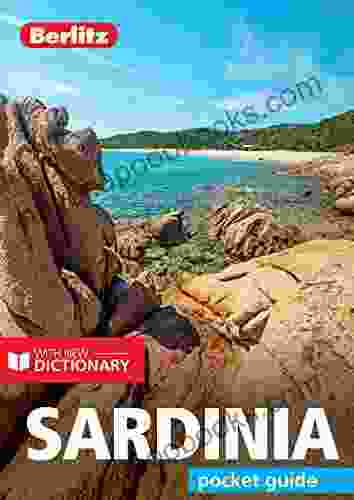
 Bruce SnyderImmerse Yourself in the Enchanting Shores of Sardinia: Your Ultimate Travel...
Bruce SnyderImmerse Yourself in the Enchanting Shores of Sardinia: Your Ultimate Travel... Edgar Allan PoeFollow ·10.1k
Edgar Allan PoeFollow ·10.1k Milton BellFollow ·6k
Milton BellFollow ·6k Jaylen MitchellFollow ·17.5k
Jaylen MitchellFollow ·17.5k Dylan MitchellFollow ·18.9k
Dylan MitchellFollow ·18.9k Jules VerneFollow ·10.1k
Jules VerneFollow ·10.1k Jamie BlairFollow ·8.1k
Jamie BlairFollow ·8.1k Quentin PowellFollow ·17k
Quentin PowellFollow ·17k Bryan GrayFollow ·11.6k
Bryan GrayFollow ·11.6k
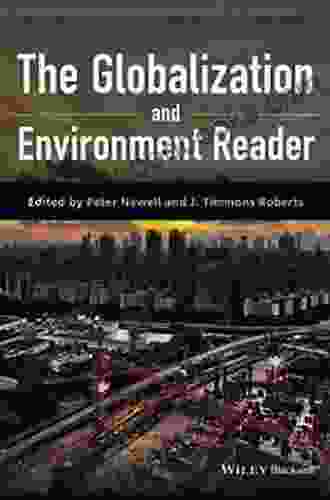
 Shaun Nelson
Shaun NelsonUnlocking the Intricate Nexus: The Globalization and the...
In an era marked by...

 Robin Powell
Robin PowellLast Summer at the Golden Hotel: A Captivating Journey of...
Synopsis: A Transformative Summer at...
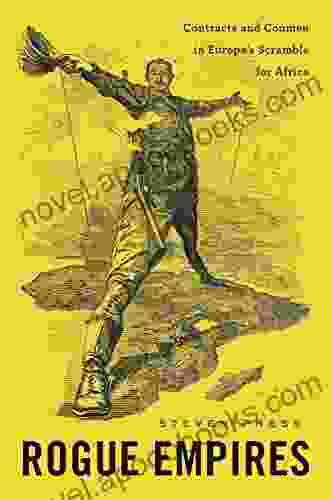
 Gabriel Mistral
Gabriel MistralContracts And Conmen In Europe Scramble For Africa
The late 19th and early...

 Glenn Hayes
Glenn HayesThe Story of the United States' Longest Wildcat Strike: A...
Prologue: The...
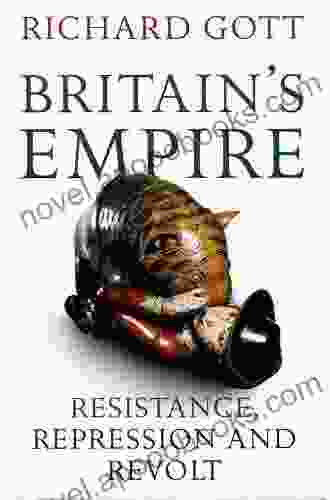
 Evan Hayes
Evan HayesBritain Empire Resistance Repression And Revolt:...
: The Tapestry of...

 Eddie Bell
Eddie BellGreen's Operative Hand Surgery: The Ultimate Guide for...
Green's Operative Hand Surgery is the...
4.6 out of 5
| Language | : | English |
| File size | : | 43209 KB |
| Screen Reader | : | Supported |
| Print length | : | 76 pages |


